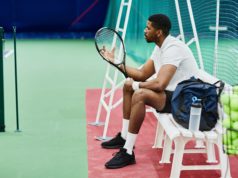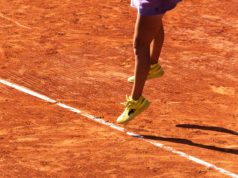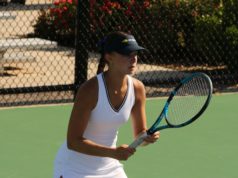By Haris Poric, Tennis Professional, Country Club of Roswell
How many times have you walked off the court after a loss and told your coach “I didn’t play well” or “my serve wasn’t working”? “Well, what does ‘playing well mean?’” is my response to my player. This question typically has no exact answer. Does it mean making every serve, forehand, and backhand? Once the player has thought it through, he or she often realizes that statistic is unrealistic and unattainable. So, what do we do when we are not playing well?
So many times, when players are losing, they blame their strokes and spend much of their focus trying to analyze and correct technical issues. This will only make life on the court more difficult as the player is then fighting a battle on two fronts — against their opponents and against themselves.
As competitive tennis players, we must understand that most points we play end in errors rather than winners, meaning that it is a game of imperfections. During a match, our focus must be on the opposite side of the net. This gives us the best chance to determine what our opponent’s strengths and weaknesses might be. The expectation to play well, even if we have a set numerical standard, is unnecessary. Rather, the question you should ask yourself is “how can I make my opponent play poorly?” In the end, the player who hits one extra ball will win the match. There are too many uncontrolled variables, such as weather, surface, balls, and altitude, for us to attain a set standard level of play in the hundreds of matches we play.
The best win-loss season in the history of the modern ATP tour was completed by Novak Djokovic in 2015 when he went on a crushing 82-6 record with a 28-0 start. However great this statistic is, players are unaware of the ‘points won’ statistic during this remarkable year. I give my students all a guess: “80 percent, 90 percent, 75 percent,” they shout confidently. The look on their faces when they hear 54.5 percent is priceless. They cannot believe that Djokovic had won only barely over half the points he played.
This just proves that to be successful in the game of tennis all you must do is be slightly better than your opponent on that given day. You do not need to rack up the stat sheet with winners and aces. Come match day, instead of trying to hit the perfect forehand or the fastest serve, your goal should be to make your opponent hit their least favorite stroke. The only way we give ourselves a chance of determining what this might be is if we stop focusing on what’s not working in our own game, and instead ‘test’ our opponent’s abilities.
For example, when I was teaching juniors, my player came off the court and was in shambles. They said “I couldn’t do anything; nothing worked. I couldn’t make a groundstroke.” I then asked them how many volleys their opponent hit during the match. They replied “none.” This student played an entire tennis match and didn’t ask their opponent such a simple question one time: “Do you know how to volley?” We are caught up in playing to our strengths and having certain ‘game styles,’ but we are lost and out of ideas if our opponent’s game style is the same but a little better than ours. We might not be comfortable bringing our opponent to the net, but all we need is to be a little better than they are at the net to win the point.
In the end, all competitive tennis players have one objective: win the match. We are a competitive species, and I can guarantee that every one of you would rather win than “play well” and come off the court as second-best. Don’t expect to bring your A game. If your opponent brings their B game, all you need is your B+ game.
 GPTA Teaching Professional Spotlight: Haris Poric
GPTA Teaching Professional Spotlight: Haris Poric
Submitted by USTA
Hometown (City/State): Sydney, Australia
How did you get involved in teaching tennis? Taught during the summers of college.
Diehard fan of what sports team? Real Madrid
Best part of your game? Serve
Dream doubles match would be me and… Roger Federer
When I’m not teaching tennis, I’m… Working out and watching tennis.
My favorite tennis memory is: Making a junior ITF doubles nal with my brother.
My favorite professional player is: Roger Federer
#1 reason why I enjoy teaching & coaching tennis: Seeing the joy on a student’s face when something we practiced worked for them in a match.
What important tennis message do you want to promote? The physical and psychological health benefits of tennis should be expressed more in the community.




